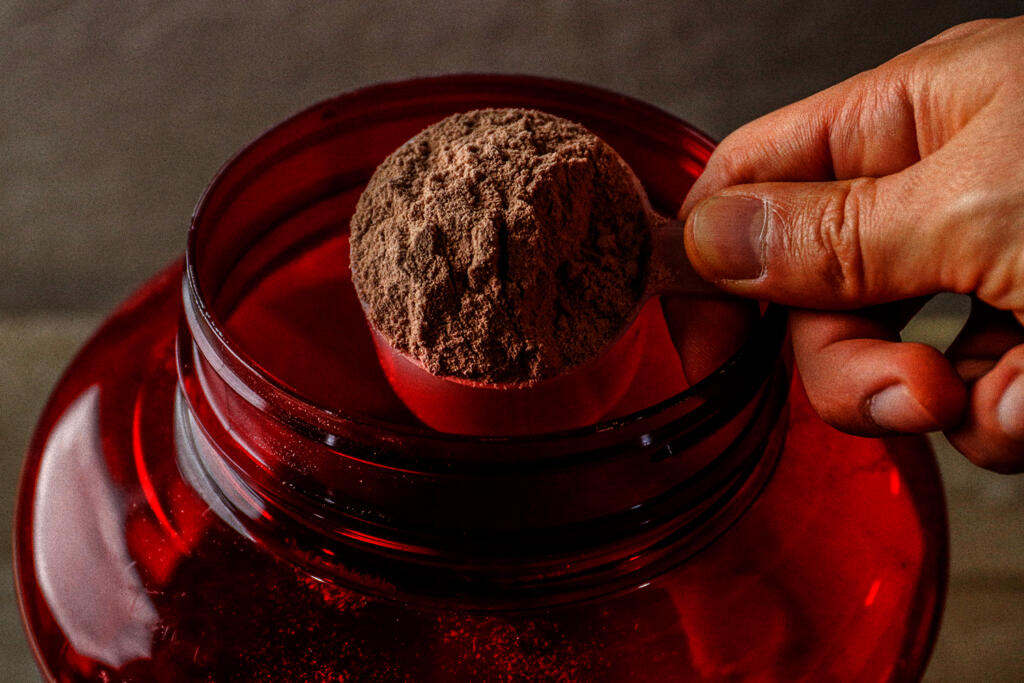How much is too much: How many protein shakes should you drink in a day max, and how many do you really need?
Everybody who is into building muscle knows that protein shakes are no longer the sole domain of psychotic, over-amped meatheads.
As if those guys need to supplement their steroid injections anyway…
No, the truth is, there’s plenty of evidence that protein shakes are a legit, fully-vetted, science-approved way to maximize your workout gains, add bulk, accentuate your macros, and speed recovery, especially when it comes to weight training.
But let’s face it: a lot of us are rather, shall we say, enthusiastic when we come across some trick, shortcut, or even just a legitimate tool that can help speed up our gains in the gym.
So, the question is this: how many scoops of protein powder a day can I drink? How many protein shakes per day is enough, how many is too many, and how much protein per day should I aim for?
First let’s start with a quick review.
What is protein?
It’s easy for people to grab onto advice from some charismatic YouTuber or that one super-ripped dude you overheard at the gym that one time and internalize it without really questioning it.
And that’s not to say that those sources are incorrect in what they believe; they may well be dead on.
Rather, the point is that when we consider workout advice, it’s best to understand a bit of the underlying science and not just the nutshell version.
That’s so you can evaluate it better and do some independent research. Rather than simply accepting workout advice, even from a trusted source, you should know why.

Making gainz with protein
So, when we talk about adding muscle mass, we talk about protein. To add bulk you need to synthesize more muscle protein than you break down.
According to studies, lifting all on its own is good for building mass. But lifting along with additional protein intake is proven to work faster and better.
Protein is made up of amino acids, which our bodies require to carry out various essential functions.
They help with transporting oxygen through the bloodstream, keeping our immune system functioning at optimal levels, and of course, building muscle.
Of the 20 varieties of amino acids, the human body makes 11, but we’re incapable of producing the remaining nine.
We call these nine essential amino acids, and ever since we came down out of the trees and evolved into anatomically modern humans, we have needed to seek them out in food sources.
Bulking up? Protein is your friend
The daily dietary recommendations for the average adult include eating 0.8 grams of protein per kilo of body weight.
If you’re a 25-year-old male who weighs 150 pounds, the American Dietetic Association recommends at least 68 grams of protein per day, according to online sources.
(Remember too that different academic and medical dietary bodies have different estimations of what the proper amount of daily protein intake is.)
At any rate, let’s go with the USDA recommendation you see on the dietary panel of every food product you buy and assume it’s the correct amount: 65 grams of protein per day.
That’s consistent with the 0.8 g per kilo of body weight figure referenced above.
However, keep in mind that’s just for regular maintenance. If you’re looking to pack on some muscle mass, you’ll need to up your protein intake in order to give your body the fuel it needs to manufacture those brutal guns you crave.
Most reputable fitness and bodybuilding authorities say that for an average person (as opposed to an elite athlete) your recommended protein intake level for gaining mass is at least 1.5 grams per kilo of body weight per day, and likely to top out around 2.2 g per kilo of body weight.
That’s about 150 grams of protein daily for a man weighing 150 pounds. (If you’re obese or significantly overweight, that number will likely be lower.)
The high end for someone of this body composition would be 225 grams of protein daily. But that type of protein intake is usually the domain of elite athletes who burn unimaginable amounts of calories each day and have truly wicked muscle recovery needs.
To put that in perspective, a 4-ounce chicken breast contains about 27 grams of protein. So, if you were aiming for the elite end of the daily protein intake scale, you’re talking about nearly 8.5 chicken breasts a day.
Alternatively, you could eat 37 eggs each day to get your protein macro taken care of for muscle gain.
Thank goodness someone thought of packing protein into powder form, right?
Enter protein powder: So how many protein shakes per day?
It depends not only on your current weight, but also your workout goals. The fact of the matter is you can use protein shakes even if you’re not trying to get your body in the kind of shape to be oiled and hit the bodybuilding circuit.
Indeed, there’s plenty of evidence out there that protein shakes can help boost your metabolism and even help with weight loss.
That’s because of that whole “macros” factor we mentioned earlier. “Boosting your macros” refers to focusing your dietary needs and fitness goals not on specific foods but rather on macronutrients: carbohydrates, fats, and our old friend protein.
Protein is the crucial macronutrient we need for muscle growth, it’s true. But beyond that, filling up on protein-heavy foods is a key component of ensuring you can stay full for longer periods of time, and thus reduce the temptation to snack and overeat.
And as bodybuilders have long known, protein shakes are a vital piece of the puzzle if mad gainz are part of your goals.
How often should you drink protein shakes?
The first thing to say about how many protein shakes per day you should aim for is that you should never treat protein shakes as a substitute for food. They’re called protein supplements for a reason: they are an additional item in your diet, not the totality of it.
Aim for a diet that leans on proteins, including lots of healthy whole foods like salmon, tuna, chicken breast, eggs, nuts, milk, and cheese.
And from there, calculate your macros and figure out how deep of a deficit you’re running on the protein front, given the rule of thumb we spoke of, around 1.5 grams per kilo of body weight for gaining muscle.
Then calculate your chosen protein shake’s numbers and find out how many you need to fill out any shortage.
Keep in mind too, that going over on your protein intake doesn’t mean you’re going to make faster gainz. If your muscles can’t process the overdose of protein you’re trying to jam into them, you’re only adding excess calories that’ll just go to your waist, not your guns.

The science of protein: Casein vs. whey protein
You’ll read about two primary types of protein bases that go into protein powders, casein and whey. The bottom line is you need both, as a Baylor University study showed. But here’s a quick breakdown on each to give you an idea of where and when you might lean on one over the other.
Whey
Whey protein is found in milk and is considered a complete protein, meaning it contains all nine of the essential amino acids our bodies can’t produce. It’s also got lower levels of fat and carbs, which assists with weight loss and reduces the chances of stomach issues.
Whey-based protein drinks will be the ones you want to hit right after a workout when your muscles are screaming for nutrition in order to rebuild.
Casein
Casein is another milk-based protein, but it’s more slow-acting than whey. It slowly releases and feeds your muscles over time.
Most trainers suggest taking a casein protein supplement at bedtime to help your muscles gain while your body is at rest – which is also the time your body recovers best.
How many scoops of protein powder a day? Try these
Here are a few of our favorite protein shakes:
Optimum nutrition gold standard whey
Gold standard 100% whey blend. This whey contains 24 grams of blended whey isolate & concentrate. It contains over 5 grams of BCAAs to Help build lean and strong muscles.
MuscleTech’s Nitro-Tech Power delivers 60g of protein from a premium multi-phase isolate & peptide blend, 14.8g of BCAA and 6g of creatine per 2 scoops
For your casein intake, try Gold Standard’s slow-acting protein powder. It contains 24 g per serving and it’s just what your body needs to build muscle while you sleep.
The bottom line is, if you’re serious about making a healthy lifestyle out of making gains in the gym, the key is to be sensible, do your research, and make a science out of your diet.
You’ll see the gains soon enough if you add these tips to a healthy diet and rigorous workout schedule!
Blitz yourself better!
This article contains general nutritional tips and advice. However, no diet or exercise program should be started without consulting your physician or other industry professional first. For more information read our full disclaimer here.
Now read these:
—Why food deserts are a problem.
—Is coffee bad for your skin?
—What are the benefits of celery juice?
—Are plant based diets effective?
—Your guide to health supplements.
